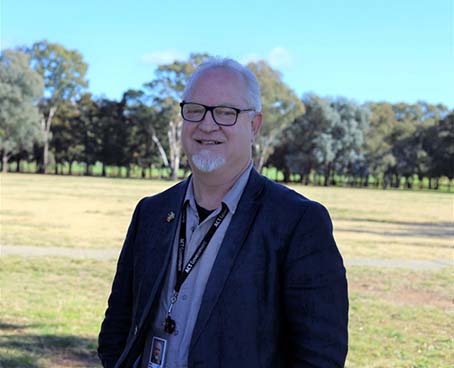
Mark Bishop started in ACT public education 53 years ago as a kindergarten student at Hackett Primary School – and he loved it so much that he never left!
Mark’s inspiring journey through the different sectors of teaching, and eventually into a role in the Indigenous Education team in the Education Support Office, show the myriad of unique and rewarding pathways that await career starters in education.
We chatted to Mark to explore where his teaching degree led him, and his reflections on a decades long career in ACT education.
What inspired you to work in education?
Growing up I had some great role models - I always liked the concept of being a teacher and the opportunities it provides. My brother-in-law was a struggling actor, I used to say to him, the best paid actors are in teaching, if you really want to teach it’s a bit of a performance. You’ve got to enjoy talking, creating and working with people and depending on what you're doing, you drop into a few different roles. You’re constantly asking, “how do I engage these kids?” and using every trick in the book to get them interested and intrigued. Sometimes, to connect, you've got to be a different sort of person for a different group of kids.
Can you describe your journey from teacher to education support staff?
Back when I was at university, if you were three year trained you could teach in primary schools whilst completing your fourth year. Teaching primary was great because it really helps you understand where the kids are coming from when they get to high school. I’ve worked at Campbell, Downer and Waramanga Primary schools (now Arawang Primary), then ended up at Lyneham High School for my first tour of duty at a high school. I’ve also worked in colleges for many years, at UC Senior Secondary College Lake Ginninderra, Narrabundah College, back to Lyneham High School and then finished as Deputy Principal at Dickson College.
What I learned about being in all three of those sectors is that there’s great things in each (especially the staff) but each sector has its unique differences from the others. In primary, you have a strong relationship with the kids and their families, you have a lot of fun with the high school kids but it’s a tricky time for them. Managing that age group is always a challenge and the college kids just love their subjects so you can really talk in-depth and get immersed in your subject. No matter what sector though you can call it lots of things, but you can never call it boring.
When I retired, I picked up this work in the Aboriginal and Torres Strait Islander section (an area of passion for most of my career) which I absolutely love. It’s been a real delight coming in here and working with an incredible team. The role they play here is critical.
Can you describe your current role?
When I first joined, ‘Cultural Integrity’ was just being introduced, it’s about helping teachers and schools to teach with Cultural Integrity, engage with students, families and community and create a school culture of respect. Schools have been really enthusiastically embracing First Nations perspectives. So, we provide resources, ideas for classrooms and facilitate other types of high impact professional learning.
I spent most of the COVID time making several videos with the local mob to assist teachers in classrooms. We did a lot of on country walks, we visited schools doing great things and showed what they were doing. The videos are meant as a springboard for classrooms so teachers can watch and get ideas of what’s possible and then make it fit in their school then, if they need it, come to us for further information and assistance.
What have you learnt in your time with ACT Education?
Teaching is a great career! The ACT is very lucky in terms of things like the college system, which I’m a huge advocate of. We also are a small enough system so we can offer so many tailor-made/ cutting edge programs. We are very lucky that people in the ACT value and understand the importance of education, which is really great for the education system. There’s also an amazing sense of community in ACT public education, in 35 years you meet a lot of good people!
